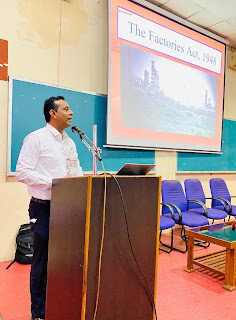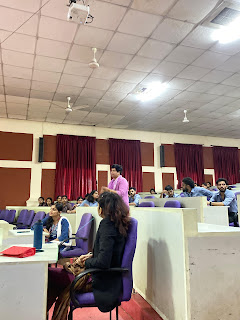The Department of Social Science and Humanities (MSW), under the Institute of Management and Commerce at Srinivas University, Pandeshwar Campus, Mangalore, successfully organized a Guest Talk on 23rd June 2025, titled “Labour Law”. The session was specially curated for the 1st and 2nd year MSW students to enhance their understanding of legal frameworks in the field of social work.
The session was led by the distinguished speaker Advocate K. Nikesh Shetty, an independent advocate and legal consultant known for his practical insights and expertise in labour law. His talk covered the essentials of labour laws for social workers, and emphasized legal rights, protections, and entitlements available to workers under various labour legislations in India.
The talk focused primarily on the role of labour laws in safeguarding the dignity, rights, and welfare of workers across sectors. Advocate Shetty elaborated on various key legislations such as the Payment of Wages Act, Minimum Wages Act, and the recent Labour Codes. He further explained the responsibilities of social workers in ensuring legal compliance, advocating for worker rights, and addressing workplace injustices.
The event was conducted under the able guidance of Dr. Venkatesh S. Amin, Dean of the Institute of Management and Commerce, and Prof. Joyson P. Cardoza, Head of the Department. The session was coordinated by Dr. Stutima Basistha, Assistant Professor, Department of MSW. The presence of faculty members including Dr. Laveen D’Mello, Prof. Vinutha H.K., and Prof. Ranjith Bhat further enriched the occasion. The event began with a warm and enlightening welcome address by Dr. Venkatesh S. Amin, who emphasized the importance of legal literacy for social work professionals.
The session proved to be highly insightful and beneficial for the students, as it bridged the gap between academic learning and real-world legal applications. It helped students understand their roles not just as change-makers, but also as legal advocates for the underprivileged and marginalized workforce. The interactive nature of the session encouraged questions, discussions, and critical thinking among the participants.
The department extends heartfelt gratitude to Advocate K. Nikesh Shetty for his valuable time and contribution, and looks forward to more such enriching sessions in the future.




















































